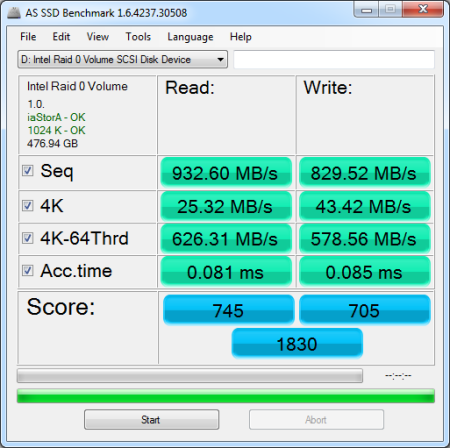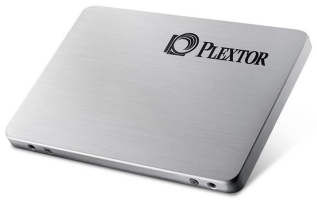

Model: Plextor PX-256M5P 256GB Solid State Drive
Manufacturer: Plextor
Provided By: Plextor LLC
As one of the biggest names in the storage industry, Plextor doesn't need much of an introduction. For more than a decade, they've produced some of the best optical drives the industry has seen. Known the world over for their quality, performance, and features, these drives have become favorites among consumers and professionals alike. Today, Plextor continues to lead the way by bringing cutting edge storage technologies to market. Along with a vast assortment of high-performance DVD and Blu-ray drives, the company offers NAS devices, external hard drives and a growing number of solid state drives.

Like many other manufacturers, Plextor has set its sights on the growing solid-state drive (SSD) market. This fall, the company launched its M5 Pro Series SSD. Powered by Plextor's new True Speed technology, this new, ultra-slim SSDe leverages high quality components like Marvell's 88SS9187 "Monet" controller chip and 19nm Toggle Mode NAND to deliver up to 540MB/s read and 450MB/s write speeds as well as a maximum of 86,000 4KB random write IOPS.
In addition to True Speed, the M5 Pro is the first SSD to feature Plextor's new True Protect technology. Using the 128-bit error correction code (ECC) built into the Marvell 88SS9187 controller, this unique data protection system is able to automatically check and correct the accuracy of data being read from the flash memory. This is backed by the robust data hold-out algorithm in Plextor’s exclusive firmware which ensures that data can be read with extremely high accuracy, even in the long-term. When data confidentiality is required, the M5 Pro uses hardware in the AES-validated Marvell controller to provide secure 256-bit full-drive encryption.
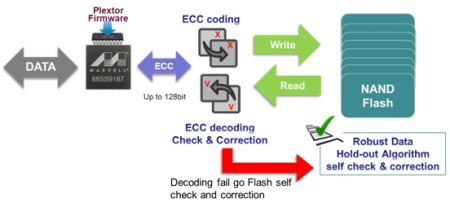
When I reviewed the M5 Pro back in September, I was very impressed by its great, all around performance as well as the technologies it brought to the table. Needless to say, when I went to purchase an SSD for my new desktop I chose the PX-256M5P. Before installing the drive in my computer though, I took it, and the one Plextor sent us for our review and ran some tests to see how well they performed in a RAID array. The results were so impressive that I had to share them with everyone. Read on to see what you can expect from a pair of PX-256M5P SSDs in an Ivy Bridge-based PC.
The test system used in this review was an HP 8300 Elite. The computer came equipped with an Intel Core i5-3470 Ivy Bridge CPU, 16GB of DDR3 1600MHz memory, Seagate Barracuda ST250DM000 250GB SATA 6 Gb/s hard drive, NVIDIA Quadro FX600 1GB PCIe graphics card and an Intel 82579-LM gigabit network card. For the operating system, I installed a fresh copy of Windows 7 Enterprise.
To test the performance of the two Plextor PX-256M5P drives in RAID, I ran a series of benchmarks using CrystalDiskMark 3.0.1, ATTO Disk Benchmark 2.46, AS SSD, Anvil's Storage Utilities and Iometer.
For simplicity's sake, I used the RAID controller built into the Intel Q77 Express chipset. I also installed the latest version (11.6.0.1030) of Intel's Rapid Storage Technology driver and used the included utility to configure the RAID array.
CrystalDiskMark 3.0.1:
First, I ran a few quick tests using CrystalDiskMark. This benchmark tool measures the performance of a storage device by testing its sequential read and write speeds as well as its random read and write speeds using blocks 512K and 4K in size.
The two PX-256M5P's performed very well when configured in a RAID 0 array. The drives were able to read at 994.9 MB/s and write at a blistering 825.4 MB/s. The sequential read speed jumped to 1066 MB/s when using RAID 1. However, its write speed dropped to 444.2 MB/s which is on par with what we saw in our original review when testing a single PX-256M5P.
ATTO Disk Benchmark 2.46:
I also used ATTO Disk Benchmark to test the PX-256M5P's sequential read and write speeds. The tests are run using blocks ranging in size from 0.5KB to 8192KB and the total length set to 256MB.
When configured as a RAID 0 array, the two PX-256M5P's were able to read at 1,061 MB/s and write at 916 MB/s. The read speed was also quite good in RAID 1. However, the write speed topped out at only 462 MB/s.
AS SSD:
AS SSD is a relatively new benchmark designed specifically for solid state drives. The application contains five synthetic tests used to determine the sequential and random read and write performance of a drive.
Anvil's Storage Utilities:
Anvil's Storage Utilities is another new benchmark designed with SSDs in mind. The standard storage benchmark measures a drive's performance by testing its transfer speeds, access times and IOPS.
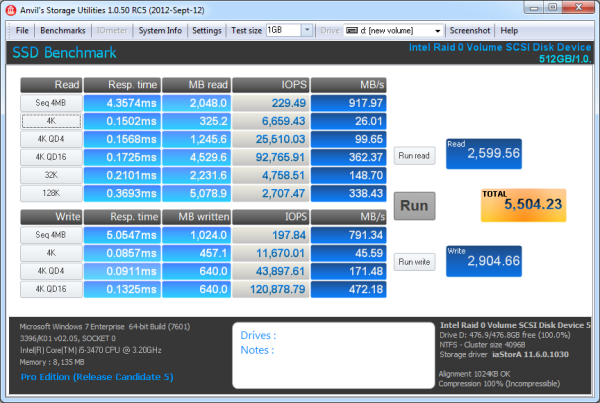
Plextor PX-256M5P - RAID 0

Plextor PX-256M5P - RAID 1
Iometer:
Lastly, I ran a series of tests using Iometer. This tool can be configured to benchmark a number of things. In this case, I used it to measure the PX-256M5P's read and write speeds and the number of operations per second. The tests were run using random bytes and a queue depth of 3 and then again at a queue depth of 32.
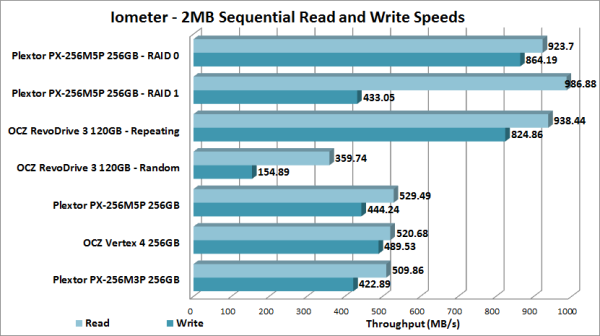
The PX-256M5P's sequential read and write performance was very similar to what we saw in our other tests. When configured as a RAID 0 array, the two drives were able to read at 923.7 MB/s and write at 864.19 MB/s. The read speed was a bit higher with RAID 1. However, the write speed dropped to 433.05 MB/s, which is slower than what we saw with a single PX-256M5P.

At low queue depths, neither RAID configuration really added much to the PX-256M5P's performance. The only real improvement was when doing random writes using RAID 0. At higher queue depths though, it was a totally different story. When configured as a RAID 0 array, the two drives were able to write at 626.93 MB/s and read at a blazing 707.96 MB/s.
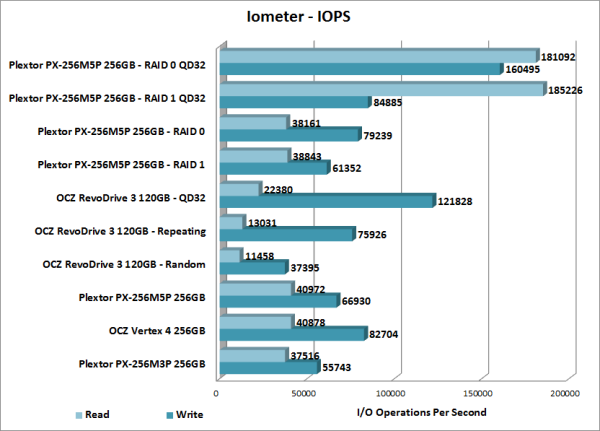
At high queue depths, the number of IOPS a pair of PX-256M5P's is capable of is down right ridiculous. When configured as a RAID 0 array, two drives reached 181,092 random read IOPS and 160,495 random write IOPS.
Final Thoughts:
Plextor's M5 Pro Series SSD is impressive by itself but when two or more are combined in a RAID array, the performance is nothing short of amazing. Using a pair of PX-256M5P's and an off the shelf, Ivy Bridge-based PC, I was able to read at speeds as high as 1,066 MB/s and write at speeds in excess of 825 MB/s. The two drives also did very well in our random write tests, producing more than 160,000 IOPS at high queue depths. That being said, there were a few cases where RAID was slower than a single drive so you'll need to look at your intended usage and see if its worth trading a bit of performance for things like redundancy.
One thing I really didn't touch on much in this article is TRIM support in RAID. While the function is supported on Intel's 7 series chipsets, it is limited to RAID 0 and you must use the company's RST (Rapid Storage Technology ) RAID driver to get it to work. If you plan on using a different flavor of RAID or a different controller, you will need to find another way to maintain optimal performance. Thankfully, Plextor's M5 Pro doesn't rely solely on TRIM to do this. The drive also uses technologies like Instant Restore, Global Wear Leveling and Bad Block Management to maintain original performance levels, even after intensive use and long periods of operation.
The M5 Pro Series is available now in 128GB, 256GB and 512GB capacities. Prices on Amazon currently range from $132 up to $455, with the PX-256M5P featured here going for about $299.





